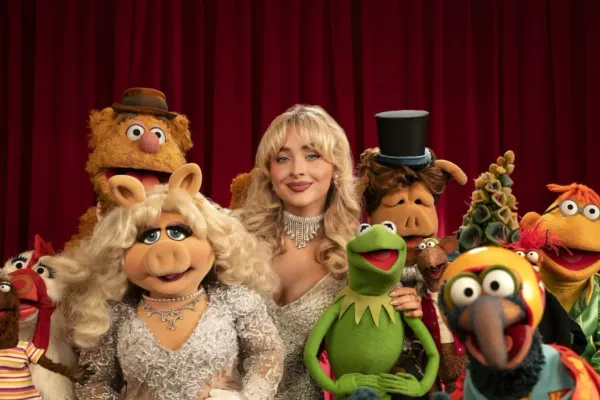Episodes: The asshole

Dylan McDermott, the Fox executives assured all of us attending the network's upfront presentation, would be playing the breakout character of the 2017-18 TV season. He was going to pull an Andre Braugher, showing off previously unknown comedic gifts in an otherwise conventional sitcom. LA to Vegas was going to be the laugh-filled hit we needed, with impressive talent behind the scenes.
Then they rolled the trailer, and whatever slim hopes I had for the show evaporated. See, Dylan McDermott was just playing The Asshole.
You probably know The Asshole well, if you've spent any time watching television. He says whatever he wants (it is, 99 percent of the time, a "he"). He does whatever he wants. He drinks copiously. He has more sex than anyone you've ever met. And because he's played by a good-looking guy, this is supposed to be charming or winning or something.
The Asshole pops up more often than not on network television, rather than cable or streaming (though there are examples there, too). I suspect this is because he's a network attempt to do a spin on a cable phenomenon: the white male antihero who gets away with it all. The problem is that the white male antihero who gets away with it all is usually a fundamentally tragic character.
You might thrill, vicariously, to the thought of Walter White or Don Draper or Tony Soprano doing whatever they want. But it's impossible to complete even an episode of their shows and think, "Hey, these guys have really got it going on!" All three men are corrupt. All three men are lonely. All three men are moral wastelands. Their shows don't just make you realize that. They make you feel that, down in your gut. And, yes, there were people who took the wrong message from all three shows, but I think it's hard to suggest Vince Gilligan or Matt Weiner or David Chase found these guys to be men worth emulating.
This becomes harder to do on network, because you have to spend so much time with the protagonist. There are shows that pulled it off. NYPD Blue is a good example (though it could be a bit didactic in trying to make sure the audience got The Point). Scandal is a current example of a show that seems in a desperate hate-hate relationship with its audience, which wants nothing more than to idolize Olivia Pope, where the people behind the show seem increasingly disgusted with her amoral behavior. (I find Scandal one of TV's most fascinating shows for this reason.)
But for the most part, network shows will dabble in having their protagonists do truly dark things, then reassure you at episode's end that it was OK they did that because they're the protagonists. This is why essentially every network procedural did a rough spin on a police violence episode that tried to suggest Sometimes Things Are Complicated For Police Officers. Literally nobody was doubting that, but network TV needs you to believe, at bottom, that its characters are on some sort of scale of virtuousness, lest you tune out. (It wasn't always this way, but there's a reason Twin Peaks is airing on Showtime and not CBS.)
Enter The Asshole, who too often seems like a parody of a network executive, cranked up to about 17. The Asshole Tells It Like It Is. He lives Fast and Hard. He's Too Much. He doesn't really seem like someone you'd like to spend time with. You might watch a movie about him -- provided that movie had enough distance to understand why he could be singularly obnoxious -- but 22 episodes of a TV show? That's a much higher bar to clear.
You can make a TV show about The Asshole work. You just need to surround him with characters who don't chuckle, roll their eyes, and say, "Oh, you." And I don't mean characters who shake their heads and say, "Not OK, man!" I mean characters who really call The Asshole on his bullshit, who find him actively unpleasant to be around. Such stuff is the world of conflict and, thus, storytelling, but it's also often the world of "quickly canceled." NBC's Buffalo Bill, a short-lived '80s comedy, plays in this space. The titular character is definitely The Asshole, but everybody around him has had it with his bullshit. It lasted two seasons.
Another solution is to turn The Asshole into a supporting character and make the point-of-view character someone who's forced to put up with him. Think of, say, Dave's relationship to Bill on NewsRadio. Bill isn't quite The Asshole, but he's close, and the thing that keeps him from being The Asshole is that he isn't at the center of the story, which allows him to show facets other than Outrageous.
A better variation is probably Cheers, though I don't know that you would think of that as an Asshole show. And the reason for that is simple: Everybody on it could be The Asshole, but nobody was The Asshole in every episode. The ensemble was filled with characters who could fill that role if the story needed conflict, or who could be properly aggrieved if someone else needed to fill the role of Biggest Jerk in Boston. On my flight home from upfronts, I watched a late season episode where both Sam and Frasier flitted in and out of that role, and I can easily think of episodes where the role was played by Carla or Rebecca or Diane or Cliff or even Norm. (Only Woody and Coach seemed more or less immune.)
Despite networks' love of shows about The Asshole, the vast majority of them fail. It's just not a character people want to spend a lot of time with from week to week. So if you're writing a spec pilot, think for a moment. Is your lead character defined almost entirely by his willingness to say or do anything? Then you might be writing about The Asshole, and it might behoove you to shift the focus to a different character or do something else entirely.
---
Our Friday mailbag feature is a lot of fun! Please email me your questions over the course of the week, and I'll pick a few to answer. I'll always answer at least three per week, unless I just don't have the material. For ease of inbox search, please put "mailbag" somewhere in the subject line of your email. Thanks!
--
Episodes is published three-ish times per week, and more if I feel like it. It is mostly about television, except when it's not. Suggest topics for future installments via email or on Twitter. Read more of my work at Vox




